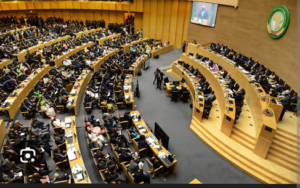By Ambasaador Kabs Kanu
Africa finds itself at a pivotal juncture, keenly observing the global landscape and drawing crucial lessons from the sociopolitical and economic developments in the West and beyond. This introspection is compelling African nations to critically re-evaluate their established socioeconomic and political trajectories, prompting a bold vision for a brighter future.

A significant step in this direction was the African Union’s (AU) historic participation as a full member in the G20 Summit in November. The G20, a forum comprising 19 countries, the European Union, and now the African Union, collectively represents approximately 85% of the world’s GDP, over 75% of global trade, and about two-thirds of the world’s population. This expanded membership provided Africa with an unprecedented platform to assert its voice on global economic issues. During the summit, the AU, alongside other developing nations, advocated forcefully for a more equitable international financial system, emphasized the urgent need for debt relief, and pushed for measures to safeguard the interests of vulnerable economies. This advocacy resonated, culminating in South Africa assuming the G20 presidency on December 1, signaling a growing recognition of Africa’s influence. As Balew Demissie, Ethiopia’s Communication and Publication Consultant at the country’s Policy Studies Institute, noted at the time, AU participation offers a vital avenue to tackle pressing challenges such as poverty, underdevelopment, and climate vulnerability, while simultaneously fostering regional solidarity and amplifying Africa’s impact on global policy decisions.
Political analysts have widely interpreted this period as “Africa’s Second Awakening,” a profound reassessment of its development trajectory. This shift, described by China Daily and others, signifies a deliberate effort to break free from the perceived constraints of Western development models and assert greater political, economic, and cultural independence. This echoes the fervor of the national liberation movements of the mid-to-late 20th century. The continent’s realization that it needs to delink from what are often characterized as neocolonialistic models of nation-building and national development, is becoming increasingly evident. However, this ambitious undertaking is fraught with considerable challenges. Issues such as poor and often inept leadership, persistent tribal and ethnic conflicts, internal disunity, and the undemocratic inclinations of some African leaders pose significant hurdles. Despite these obstacles, the imperative for Africa to forge its own path is undeniable. The critical need now lies in cultivating the moral and political will, coupled with the intellectual genius, to craft governance and development models that are authentically in consonance with Africa’s rich history, diverse cultures, and collective aspirations.